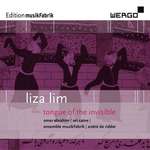Work
Tongue of the invisible : a work for improvising pianist, baritone singer and 16 musicians
by Liza Lim (2011)
Audio Sample
|
|
Performance by Uri Caine, Omar Ebrahim, André de Ridder, Ensemble musikFabrik from the CD Tongue of the invisible |

$POA

This item may be available to purchase from the Australian Music Centre.
Please contact our Sales Department to confirm pricing and availability.
Score
Tongue of the invisible : a work for improvising pianist, baritone singer and 16 musicians / Liza Lim.
Library shelf no. Q 783.88547/LIM 1 [Available for loan]
Work Overview
A one-hour song cycle composed by Liza Lim, setting the poetry of Hafez translated/ adapted by Jonathan Holmes, for baritone, improvising pianist and 16 musicians.
Project Description:
Improvisation as unpredictable play
Song as longing for the Divine
Musicians as listeners, drunk with desire
The Concert Hall as a tavern, a meeting-place between
world and other
The work is structured as an unfolding narrative of fixed and open (guided improvised forms) where the creative contribution of the musicians enacts a metaphor for pathways for renewal and the creation of multiplicity of meaning that is in dialogue with the composed music.
Work Details
Year: 2011
Instrumentation: Baritone singer, piano (doubling melodica), flute (doubling alto flute and piccolo), oboe (doubling lupophone), clarinet (doubling bass clarinet), bassoon (doubling contraforte), alto saxophone (doubling baritone saxophone), horn, trumpet double bell (doubling flugelhorn), trombone (tenor/bass), euphonium, percussion (1 player), cimbalom, 2 violins, viola, cello, double bass.
Duration: 60 min.
Contents note: 1. At dawn I heard the tongue of the invisible -- 2. Between the pages of the world (i) -- 3. This door is the mouth of love -- 4. Between the pages of the world (ii) -- 5. The roots of the world are entwined in the wind -- 6. Between the pages of the world (iii) -- 7. Encircling its towers with a silver coronet of song -- 8. Our embraces are a banquet of revolving time.
Commission note: Commissioned by Ensemble musikFabrik, Kunststiftung NRW, Holland Festival.
First performance: by Omar Ebrahim, Uri Caine, Ensemble musikFabrik, André de Ridder — 8 Jun 11. Bimhuis, Amsterdam
Analysis
Article: Distributed Creativity and Ecological Dynamics: A Case Study of Liza Lim’s ‘Tongue of the Invisible’
by Eric Clarke, Mark Doffman, and Liza Lim; Oxford University, University of Huddersfield © OUP
Music and Letters, OUP (Pay per view)
This essay addresses distributed creative processes in the preparation and performance of a new musical work—Tongue of the Invisible by Liza Lim, commissioned by the Cologne-based Ensemble musikFabrik. Situating the research within a broadly ecological perspective, and in the specific context of the interface between composition, improvisation, and performance, the study offers a social and distributed understanding of creative production.
Subjects
- In the form/style of: Song Cycles
Performances of this work
5 Nov 2017: at Ensemble Musikfabrik (Philharmonie Essen). Featuring Ensemble musikFabrik.
25 Jun 11: Kalus-von-Bismarck-Saal, WDR Funkhaus in the Wallrafplatz, Cologne, Germany. Featuring Omar Ebrahim, André de Ridder, Ensemble musikFabrik, Uri Caine.
8 Jun 11: Bimhuis, Amsterdam. Featuring Uri Caine, Ensemble musikFabrik, André de Ridder, Omar Ebrahim.
User reviews
Add your thoughts to the discussion of this work.
To post a comment please login.
My favourite Australian art song repertoire
Posted by Australian Music Centre on 22 July, 2013
The AMC asked leading practitioners to select their favourite Australian art song repertoire, to provide delegates to the 2013 International Conference of Vocal Teachers (Brisbane 2013) with an introduction to this rich and diverse landscape.
This piece for baritone, improvising pianist and 16-piece instrumental ensemble is a recent addition to Lim’s considerable body of vocal music. Her works have significantly expanded and enriched the palate of vocal writing in the musical world at large; this work makes use of a fabulously diverse range of rhythmic, timbral and stylistic characters inspired by the words of the Sufi poet Hafez. The poetry raises complex issues of performer, audience and environmental subjectivity and these are wonderfully realized in the music. In addition to lengthy sections led by the virtuoso baritone, the piece makes use of extensive instrumental solos that push the instruments at least as hard as the singer, in the pursuit of fascinating timbres and intense expression.
Jessica Aszodi
